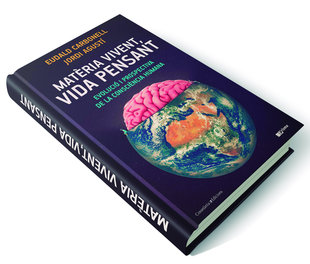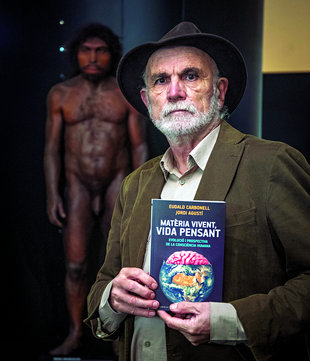Interview
Eudald Carbonell
Archaeologist
“Homo Sapiens must tear down hierarchies and leaders”
In his new book, ‘Matèria vivent, vida pensant’ (Living Matter, Thinking Life), the archaeologist explores the future of humans, arguing that as a species we have to do away with hierarchy and leadership
Matèria vivent, vida pensant
Authors: Eudald Carbonell & Jordi Agustí Publisher: Cossetània Pages: 224 Price: 18.50 euros
“We need to redefine the framework of humanisation to classify ourselves as thinking and conscious animals socialised by technology”
“Irresponsible evolution and unconscious progress are our main shortcomings and COULD lead us to collapse as a species”
In the book, you say “we face challenges that have never been posed with such a widespread species on the planet.” What are these challenges?
The most important is the socialisation of the scientific-technological revolution. Using technology to introduce science into the social relations of production has completely changed the way humans adapt. Never before has an animal species on the planet had such a large operational capacity. Second, humans are overwhelmingly intervening in climate change. Third, we have grown exponentially in number. Fourth, we grouped ourselves in large urban concentrations in the Neolithic revolution 8,000 years ago, and then again in the industrial revolution over 200 years ago. And now in the scientific-technological revolution of the late 20th and early 21st century. We need to metabolise these changes or we’ll collapse.
You say we have a high probability of species collapse because things have not gone well. What went wrong and how can we reverse it?
Hominisation and humanisation have been an integrated process. This means that biological evolution and social, technical and cultural evolution have gone hand in hand. Now, our ability to adapt is tied to our operational consciousness and at the same time to our critical species consciousness. The latter is not socialised, it is still an emerging consciousness. It has taken us too long to realise the importance of this human acquisition, and our animal character has dominated our ability to relate. Irresponsible evolution and unconscious progress are our most important shortcomings and could lead us to collapse as a species. Real cooperative relations and conscious technological socialisation are needed.
What can a crisis like this coronavirus pandemic teach us?
Loss of diversity and mobility may be at the root of this type of pandemic. So the first thing we need to learn is to maintain and increase this diversity. Homogenising the planet is a species mistake. In this sense, globalisation is a great human error. We need to change the process of human adaptation. We must stop the destruction of diversity in the context of a collaborative but not homogeneous species. Covid may have taught us to improve our level of self-criticism, and if so, we’ll have made a lot of progress.
Does it mean that we have not been able to react quickly and effectively to the pandemic?
The lack of anticipation, the lack of planning in a species that has great technological and social capabilities is difficult to understand. We’re able to generate a planetary network, but we don’t understand what species interdependence means. It’s a contradiction that indicates to us that the direction of our species is hijacked by interests of extractive and non-inclusive classes. We’re in the hands of incompetence and competitiveness, not species competition. A competent and non-competitive species would have collaborated from the outset in planning and establishing survival protocols, but this hasn’t happened.
Does the fact that vaccines have been available in less than a year indicate that we have evolved in the world of knowledge?
The socialisation of science and technology are Homo Sapiens’ great adaptive keys. Knowledge is the basis of cultural selection that must eventually replace natural selection. Human adaptation must take place in such a way that human goals are balanced with the functioning of our environment, but from a goal-driven perspective and not by chance. This is the role of knowledge, and it must be the role of thought.
In the book, you insist we must get away from hierarchies and leadership.
The destruction of hierarchy is probably the most important action that Homo Sapiens can take to be organised from a rational and conscious perspective. Organisation and coordination are complementary, while the pyramid structure is unnecessary coercion. It can range from despotism to paternalism, two human social diseases that make us worse as a species. Leadership is failure and shows the human inability to achieve interdependence. Co-responsibility of the species is the answer against imposition.
You also say that we need greater critical consciousness as a species.
Consciousness is a human fact born out of the social evolution of intelligence. Critical ability is an incorporation that we humans have made, by introducing doubt into all decision-making that harms us as a group. Only an education based on empirical knowledge and humanistic thought, within the framework of technological humanism, can lead us to an individual practice of a kind that is at the same time a collective intellectual practice. A critical and intergenerational social education and practice would break down the mechanisms of educational separation by age. Consciousness must be incorporated as soon as humans have the capacity to think for themselves.
You say “we run the risk of losing our cultural diversity”? Why?
Not only do we run the risk of losing our cultural diversity, but what’s diverse is already in the process of disappearing. We must take appropriate measures against this loss of diversity of cultures and languages, which have been the keys to our evolutionary success as a unique hybrid species for 40,000 years. If we lose cultural diversity, we lose the memory of the human system that has been built throughout our evolution.
“Our evolution has been random and that has made us who we are and not what we want to be,” you say. Should technology, rather than chance, change our course?
Obviously, as a social and technological species, we must use our strengths to give us a specific direction. Most likely this humanisation is not possible without technology becoming socialised, meaning it’s available to everyone, and not only in terms of functional use, but also the knowledge required, both theoretical and practical. Only this way can the control of the elites and their power be avoided. A critical technological humanism assures us of a collectivity in which individuals can contribute what they know.
Is climate change one of the aspects that will most condition our future?
The planet is a structure and a system that works by the laws of thermodynamics. Living things live in the biosphere, but we need the hydrosphere, geosphere and atmosphere to survive and reproduce. Climate change has occurred throughout the planet’s history. When humans did not yet exist, climate change was already frequent. The difference is that right now irresponsible human consumption as well as the form and use of energy are contributing to the greenhouse effect in a world of over seven billion specimens and this is endangering our future.
You spend a chapter talking about extinction. Are we really in a great mass extinction?
It’s called the Sixth Extinction. The last one, 60 million years ago, was in the Cretaceous period, when there was the extinction of a large number of species, the best known being the dinosaurs, which allowed the development of mammals, including our ancestors. Extinction is a loss of diversity to which we humans are contributing. This is a danger not only to endangered species. We should not consciously or unconsciously contribute to extinction, because the resulting changes are against our interests.
Why do you say that we Homo Sapiens of the 21st century struggle between the reality of who we are and what we are unaware we want to be?
We’re a living contradiction. We’ve not yet built the foundations that should underpin what should make us human; not by our nature, but by our convictions. We need to redefine the framework of humanisation to classify ourselves as thinking and conscious animals socialised by technology. This means that only in the framework of technological humanism do we have the possibility of finishing the construction of the human edifice.
You also think that the education model must be changed.
Yes. The current systematised educational model, while there are interesting initiatives, should be transformed. I’ve strongly insisted on the substitution of values for critical awareness. For an intergenerational way of passing on knowledge, for learning based on the ability to learn dialectically and linked to the logic of our society. An education in technological humanism that allows us to synchronise with our environment. An education based on knowledge and species thought, to substantiate collective individuality and not to collectivise individuality or promote individualism and competitiveness but competence and complementarity.
In the book you point out that “we have not yet found the path that will allow us to be truly human.” Are we close to finding it?
We must understand that the practical fact of humanising ourselves inexorably leads us to dehumanisation. This means that when we replace chance with logic we’ll take a direction in our anthropic growth, I mean a teleonomic goal. This goal-oriented direction will allow us to transfer our animality with the help of technology and become an artificial project, differentiated from the natural inertias that have built us. Probably in this process we’ll generate artificial human diversity and socialise transhumanism, then we’ll realise that by becoming human we have ceased to be human.
interview
interview Eudald Carbonell
Leave a comment
Sign in.
Sign in if you are already a verified reader.
I want to become verified reader.
To leave comments on the website you must be a verified reader.
Note: To leave comments on the website you must be a verified reader and accept the conditions of use.




